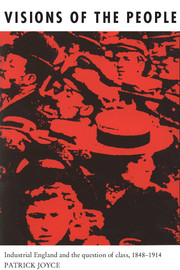Book contents
- Frontmatter
- Contents
- List of plates
- Acknowledgements
- 1 Introduction: beyond class?
- PART I POWER AND THE PEOPLE: POLITICS AND THE SOCIAL ORDER
- 2 The languages of popular politics: from radicalism to Liberalism
- 3 Class, populism and socialism: Liberalism and after
- PART II MORALISING THE MARKET: WORK AND THE SOCIAL ORDER
- PART III CUSTOM, HISTORY, LANGUAGE: POPULAR CULTURE AND THE SOCIAL ORDER
- PART IV KINGDOMS OF THE MIND: THE IMAGINARY CONSTITUTION OF THE SOCIAL ORDER
- Appendices
- Bibliographical note
- Notes
- Index
2 - The languages of popular politics: from radicalism to Liberalism
Published online by Cambridge University Press: 05 March 2012
- Frontmatter
- Contents
- List of plates
- Acknowledgements
- 1 Introduction: beyond class?
- PART I POWER AND THE PEOPLE: POLITICS AND THE SOCIAL ORDER
- 2 The languages of popular politics: from radicalism to Liberalism
- 3 Class, populism and socialism: Liberalism and after
- PART II MORALISING THE MARKET: WORK AND THE SOCIAL ORDER
- PART III CUSTOM, HISTORY, LANGUAGE: POPULAR CULTURE AND THE SOCIAL ORDER
- PART IV KINGDOMS OF THE MIND: THE IMAGINARY CONSTITUTION OF THE SOCIAL ORDER
- Appendices
- Bibliographical note
- Notes
- Index
Summary
The study of popular radical politics in early nineteenth-century England has recently resulted in productive discussion of how the social order may have been seen by the labouring populations of the time. Writing on Chartism, Stedman Jones has argued that radical discourse was not an expression of underlying ‘experience’ but itself actively served to constitute this experience. Rather than being the outcome of the economic and social situation of early industrialism, the terms of reference of Chartism were political. Rather than a ‘class’ language of an economic, proto-socialist kind what was evident was the category of the ‘people’, and with it though Stedman Jones is not clear on this – a ‘populist’ politics. But as I have argued in the introduction, this is in many respects an inadequate guide to class, to language and to politics.
Nonetheless, it does pose some very important questions. The question of populism will be directly addressed in the following chapter. In chapter 4, the relationship between politics and economics in the formation of discourse and values will be explored in a more systematic fashion. This chapter is concerned with the nature of political programmes and appeals, with what are here called political languages. The success of political movements and parties may be said in large part to turn upon the elaboration of effective political languages, and something of this is traced here in terms of the transition from radicalism to Liberalism in the third quarter of the nineteenth century.
- Type
- Chapter
- Information
- Visions of the PeopleIndustrial England and the Question of Class, c.1848–1914, pp. 27 - 55Publisher: Cambridge University PressPrint publication year: 1991
- 3
- Cited by



